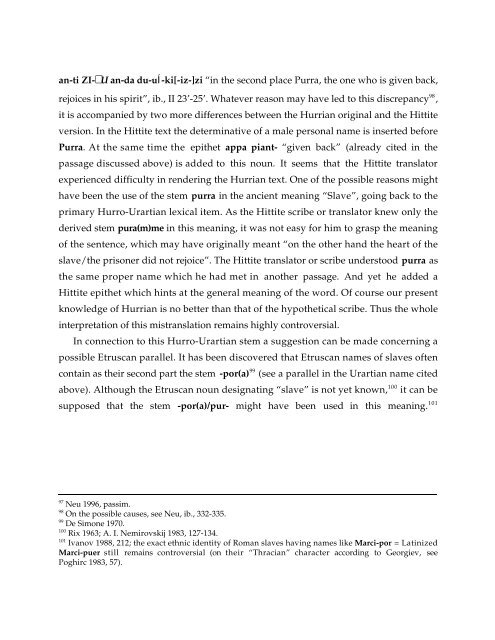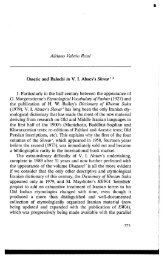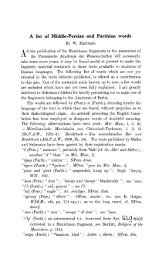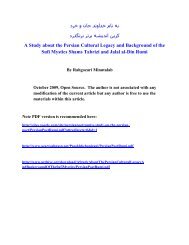Comparative Notes on Hurro-Urartian, Northern Caucasian
Comparative Notes on Hurro-Urartian, Northern Caucasian
Comparative Notes on Hurro-Urartian, Northern Caucasian
Create successful ePaper yourself
Turn your PDF publications into a flip-book with our unique Google optimized e-Paper software.
an-ti ZI- U an-da du-uÍ-ki[-iz-]zi “in the sec<strong>on</strong>d place Purra, the <strong>on</strong>e who is given back,<br />
rejoices in his spirit”, ib., II 23’-25’. Whatever reas<strong>on</strong> may have led to this discrepancy 98 ,<br />
it is accompanied by two more differences between the Hurrian original and the Hittite<br />
versi<strong>on</strong>. In the Hittite text the determinative of a male pers<strong>on</strong>al name is inserted before<br />
Purra. At the same time the epithet appa piant- “given back” (already cited in the<br />
passage discussed above) is added to this noun. It seems that the Hittite translator<br />
experienced difficulty in rendering the Hurrian text. One of the possible reas<strong>on</strong>s might<br />
have been the use of the stem purra in the ancient meaning “Slave”, going back to the<br />
primary <strong>Hurro</strong>-<strong>Urartian</strong> lexical item. As the Hittite scribe or translator knew <strong>on</strong>ly the<br />
derived stem pura(m)me in this meaning, it was not easy for him to grasp the meaning<br />
of the sentence, which may have originally meant “<strong>on</strong> the other hand the heart of the<br />
slave/the pris<strong>on</strong>er did not rejoice”. The Hittite translator or scribe understood purra as<br />
the same proper name which he had met in another passage. And yet he added a<br />
Hittite epithet which hints at the general meaning of the word. Of course our present<br />
knowledge of Hurrian is no better than that of the hypothetical scribe. Thus the whole<br />
interpretati<strong>on</strong> of this mistranslati<strong>on</strong> remains highly c<strong>on</strong>troversial.<br />
In c<strong>on</strong>necti<strong>on</strong> to this <strong>Hurro</strong>-<strong>Urartian</strong> stem a suggesti<strong>on</strong> can be made c<strong>on</strong>cerning a<br />
possible Etruscan parallel. It has been discovered that Etruscan names of slaves often<br />
c<strong>on</strong>tain as their sec<strong>on</strong>d part the stem -por(a) 99 (see a parallel in the <strong>Urartian</strong> name cited<br />
above). Although the Etruscan noun designating “slave” is not yet known, 100 it can be<br />
supposed that the stem -por(a)/pur- might have been used in this meaning. 101<br />
97 Neu 1996, passim.<br />
98 On the possible causes, see Neu, ib., 332-335.<br />
99 De Sim<strong>on</strong>e 1970.<br />
100 Rix 1963; A. I. Nemirovskij 1983, 127-134.<br />
101 Ivanov 1988, 212; the exact ethnic identity of Roman slaves having names like Marci-por = Latinized<br />
Marci-puer still remains c<strong>on</strong>troversial (<strong>on</strong> their “Thracian” character according to Georgiev, see<br />
Poghirc 1983, 57).





